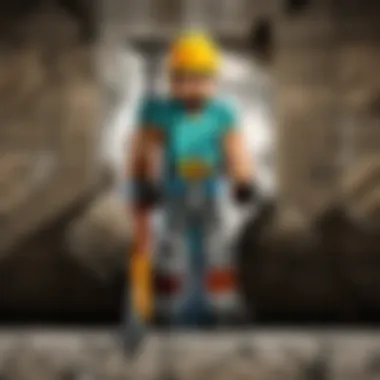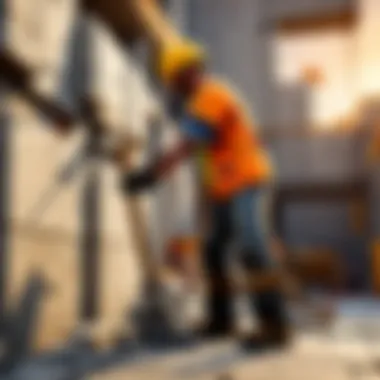Unveiling the Intricacies of Concrete Mason Careers in Construction


Minecraft Game Guides
In the realm of construction and craftsmanship, the role of a concrete mason stands out as a pillar of strength and precision. Much like building intricate structures in Minecraft, concrete masons in the real world are tasked with creating solid foundations and durable finishes in various construction projects. To excel in this field, a concrete mason must possess a blend of technical skills, artistic flair, and unwavering attention to detail.
While in Minecraft, players can unleash their creativity by constructing imaginative designs block by block; concrete masons translate blueprints into physical structures, using bricks, blocks, and mortar to bring architects' visions to life. The parallels between virtual building in Minecraft and real-world construction underscore the importance of meticulous craftsmanship and spatial awareness in both realms.
From mastering the art of laying bricks with precision to interpreting complex designs with accuracy, concrete masons navigate a world where every measurement, angle, and joint matters. Just as Minecraft players strategize their placements to ensure structural stability and aesthetic appeal, concrete masons must calculate load-bearing capacities and adhere to safety regulations to guarantee the longevity and integrity of their creations.
Each brick strategically positioned by a concrete mason mirrors the calculated placements in Minecraft, where players consider factors like symmetry, functionality, and design cohesion. The blend of technical proficiency and creative thinking required in both contexts highlights the intricacies and challenges inherent in construction, whether within a virtual realm or the physical world.
Introduction to Concrete Masonry
Concrete masonry plays a crucial role in the construction industry, offering a strong foundation for various structures. In this section, we will explore the fundamental aspects of concrete masonry, highlighting its significance and impact on modern construction practices. Understanding the basics of concrete masonry is essential for anyone looking to embark on a career in this field. By delving into the intricacies of this technique, individuals can grasp the importance of precision, durability, and innovation in building solid structures.
Defining Concrete Masonry
Concrete masonry, also known as concrete block construction, involves using concrete blocks or slabs to create walls, foundations, and other structures. These blocks are made of concrete, cement, aggregate, and water, offering a versatile and durable solution for construction projects. Concrete masonry requires careful planning and attention to detail to ensure the proper arrangement and alignment of blocks, resulting in structurally sound and aesthetically pleasing buildings.
Historical Significance
The historical significance of concrete masonry dates back centuries, with ancient civilizations such as the Romans and Egyptians utilizing similar techniques in their architectural marvels. The use of concrete blocks and brickwork revolutionized the construction industry, paving the way for taller, more stable structures. Over time, advancements in masonry methods and materials have shaped modern construction practices, enhancing the durability and efficiency of concrete structures.
Evolution of Concrete Masonry Techniques


The evolution of concrete masonry techniques has been marked by continuous innovation and improvement. From traditional bricklaying methods to modern precast concrete systems, the industry has seen significant advancements in efficiency, sustainability, and design possibilities. Technological developments, such as automated bricklaying machines and 3D printing technologies, have revolutionized the way concrete masonry is approached, offering new opportunities for creativity and precision in construction projects.
Roles and Responsibilities of Concrete Masons
Concrete masons play a pivotal role in the construction industry, responsible for laying bricks, blocks, and concrete to create various structures. Their primary duty is to ensure the strength, durability, and integrity of the building by following precise blueprints and construction plans. The significance of the roles and responsibilities of concrete masons cannot be understated, as they form the foundation of any construction project. From constructing walls, floors, to even intricate design elements, concrete masons must possess a keen eye for detail and a deep understanding of construction techniques.
Structural Work
When it comes to structural work, concrete masons are tasked with executing the foundational elements of a building. This involves laying concrete blocks or bricks with meticulous precision, following all safety protocols and structural guidelines. Each brick or block must be strategically placed to ensure the stability and structural integrity of the entire building. Concrete masons must be adept at interpreting architectural blueprints and designs, translating them into tangible structures that meet industry standards.
Aesthetic Considerations
In addition to the structural aspects, concrete masons also need to pay attention to aesthetic considerations. They are responsible for creating visually appealing finishes on walls, floors, and other surfaces. This requires a creative approach towards working with different materials and textures to achieve the desired aesthetic outcome. From smooth finishes to intricate designs, concrete masons must showcase a balance between functionality and beauty in their work, adding value to the overall construction project.
Quality Control
Quality control plays a crucial role in the work of concrete masons. They are tasked with ensuring that all materials used meet quality standards and that the construction process complies with regulations. Concrete masons must conduct regular inspections, tests, and evaluations to guarantee the durability and safety of the structures they build. Attention to detail is key when it comes to quality control, as even minor flaws can compromise the overall integrity of the building. By upholding strict quality control measures, concrete masons contribute to the longevity and reliability of construction projects.
Skills and Qualifications
In the realm of concrete masonry jobs in the construction industry, possessing the right skills and qualifications is paramount to success. Individuals venturing into this field must exhibit a combination of technical expertise, physical endurance, and keen attention to detail. Without these foundational attributes, navigating the complex world of concrete masonry can prove challenging.
Technical Proficiency plays a crucial role in the toolkit of a concrete mason. Mastery of techniques such as laying bricks, mixing mortar, and understanding structural plans is essential for executing projects with precision. The ability to interpret blueprints accurately and apply mathematical calculations to determine material requirements showcases a concrete mason's technical acumen. Moreover, staying updated on advancements in construction technology is vital to ensure proficiency in modern building practices.
Physical Stamina is a non-negotiable requirement for concrete masons. The nature of the job demands long hours of standing, lifting heavy materials, and working in various weather conditions. Endurance and physical strength are prerequisites for handling the physical rigors of masonry work. Additionally, maintaining overall fitness and incorporating proper lifting techniques are essential to prevent injuries and sustain performance on the job.


Attention to Detail sets exceptional concrete masons apart from their peers. Every brick laid, every joint sealed, and every surface smoothed requires a meticulous eye for precision. Identifying imperfections, aligning structures accurately, and ensuring consistency in patterns are all part of a concrete mason's commitment to craftsmanship. The devil truly lies in the details, and a keen attention to every aspect of the project guarantees a high-quality outcome that meets industry standards.
Challenges Faced by Concrete Masons
In the realm of concrete masonry, challenges are omnipresent, sculpting the landscape of this demanding profession. Concrete masons navigate through a maze of obstacles, honing their skills amidst adversities to create enduring structures. The section on 'Challenges Faced by Concrete Masons' elucidates the grit and resilience essential in mastering this craft.
Weather Conditions
Weather conditions serve as a formidable adversary to concrete masons, influencing the efficacy and durability of their work. From scorching summer heat to chilling winter frost, each season poses unique challenges. Extreme temperatures can hasten or impede the curing process of concrete, affecting structural integrity. Rainfall and humidity levels demand meticulous planning to prevent moisture-related issues like efflorescence and cracking.
Safety Hazards
Safety stands paramount in the realm of concrete masonry, with hazards lurking at every construction site corner. Concrete masons brave perilous scenarios, juggling heavy machinery, heights, and hazardous materials. Adherence to strict safety protocols is non-negotiable, mitigating risks of falls, ergonomic injuries, and exposure to harmful chemicals. Constant vigilance and precautionary measures form the bedrock of a secure work environment.
Time Constraints
Time becomes a precious commodity for concrete masons, shaping the rhythm of their projects. From stringent deadlines set by project managers to unpredictable delays, time constraints exert immense pressure. Balancing quality craftsmanship with swift execution is a perpetual challenge, requiring astute time management and adaptability. Efficiency reigns supreme as concrete masons strive to meet timeliness without compromising the structural integrity or aesthetic finesse of their creations.
Career Opportunities in Concrete Masonry
Concrete masons proficient in residential construction assume responsibilities that involve the construction of homes, from laying foundations to erecting walls. This specialization requires attention to detail and precision, as residential structures form the core of a community, demanding quality craftsmanship.
Commercial projects offer concrete masons the chance to work on larger-scale constructions such as office buildings, shopping centers, and industrial complexes. The scope of commercial projects provides exposure to intricate designs and structural complexities, pushing masons to enhance their technical skills and problem-solving abilities.


Specialized masonry work delves into niche areas within the construction industry, such as restoration projects, heritage conservation, or artistic installations. This branch of concrete masonry offers creative freedom and the opportunity to work on unique projects that demand innovation and expertise beyond traditional construction practices.
Training and Development
Training and development play a crucial role in understanding and mastering the complexities of concrete mason jobs in the construction industry. Aspiring masons must undergo rigorous training to hone their skills and enhance their craftsmanship. Training programs provide a foundation in the fundamental techniques of concrete masonry, emphasizing precision, structural integrity, and aesthetic appeal. Additionally, development opportunities allow masons to stay abreast of the latest industry trends and technological advancements, ensuring that they remain competitive and proficient in their field.
Apprenticeship Programs
Apprenticeship programs offer aspiring concrete masons hands-on experience under the guidance of seasoned professionals. These programs blend theoretical knowledge with practical skills, allowing apprentices to work on real-world projects while receiving mentorship and supervision. By participating in apprenticeships, individuals gain a comprehensive understanding of the intricacies of concrete masonry, from mixing mortar to laying bricks with precision. Furthermore, apprenticeship programs instill important values such as teamwork, attention to detail, and commitment to excellence, shaping individuals into skilled and knowledgeable masons.
Continuing Education
Continuing education is essential for concrete masons to stay updated with evolving techniques, materials, and regulations in the construction industry. Through workshops, seminars, and courses, masons can expand their knowledge base and enhance their expertise in specialized areas of masonry work. Continuing education empowers masons to adapt to emerging technologies and innovative practices, ensuring that they deliver high-quality craftsmanship that meets the demands of modern construction projects. By investing in ongoing education, concrete masons can elevate their skills, differentiate themselves in the market, and pursue advanced career opportunities.
Certifications and Licenses
Obtaining certifications and licenses is a significant milestone for concrete masons, demonstrating their proficiency and commitment to professionalism. Accredited certifications validate masons' skills and knowledge, providing reassurance to clients and employers about their capability to deliver exceptional work. Licensing requirements vary by region, but generally involve passing examinations that assess masons' understanding of building codes, safety protocols, and industry best practices. By acquiring certifications and licenses, concrete masons can bolster their credibility, expand their client base, and access higher-paying job opportunities in the dynamic construction sector.
The Future of Concrete Masonry
Technological Advancements
Technological advancements play a pivotal role in revolutionizing the field of concrete masonry. With the integration of cutting-edge technologies such as 3D printing, BIM (Building Information Modeling), and robotic automation, concrete masons are experiencing a paradigm shift in their methodologies. These advancements streamline processes, enhance precision, and significantly reduce construction timelines. Embracing these technological tools empowers masons to execute projects with a higher degree of accuracy and efficiency, ultimately elevating the overall quality of their work.
Sustainable Practices
In a world increasingly focused on sustainability, the implementation of eco-friendly practices in concrete masonry is no longer a choice but a necessity. The rising awareness of environmental impact has spurred a demand for sustainable solutions within the construction industry. Concrete masons are incorporating practices such as using recycled materials, optimizing energy efficiency, and reducing waste production to align with green building standards. By prioritizing sustainability, masons not only contribute to environmental conservation but also enhance the longevity and durability of their structures, meeting the needs of eco-conscious clients and regulations.
Industry Trends
Keeping abreast of industry trends is crucial for concrete masons looking to stay competitive and relevant in the dynamic construction sector. From advancements in materials and techniques to shifts in design preferences and client expectations, staying informed about current industry trends is essential. By adapting to emerging trends such as modular construction, smart technologies, and agile project management, concrete masons can position themselves as versatile professionals capable of meeting the diverse demands of contemporary construction projects. Awareness of industry trends equips masons with the foresight to anticipate changes and proactively adjust their practices, ensuring continued success and growth in the ever-evolving world of concrete masonry.



